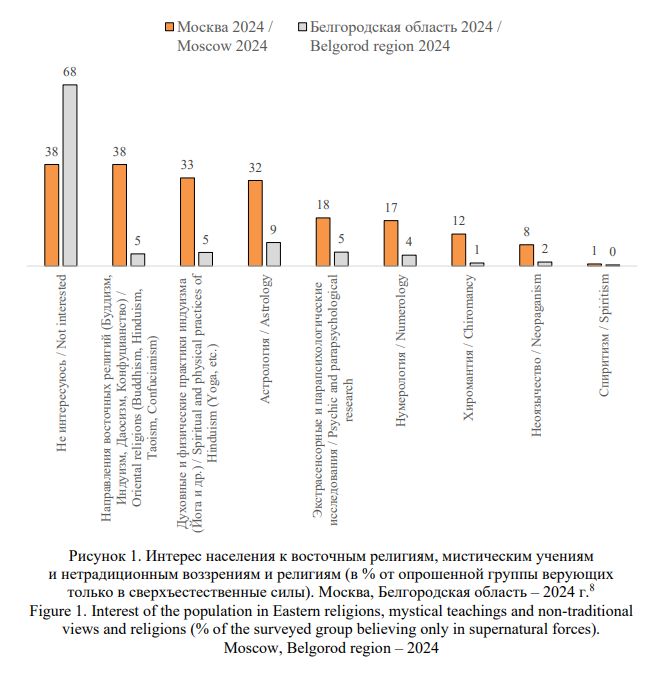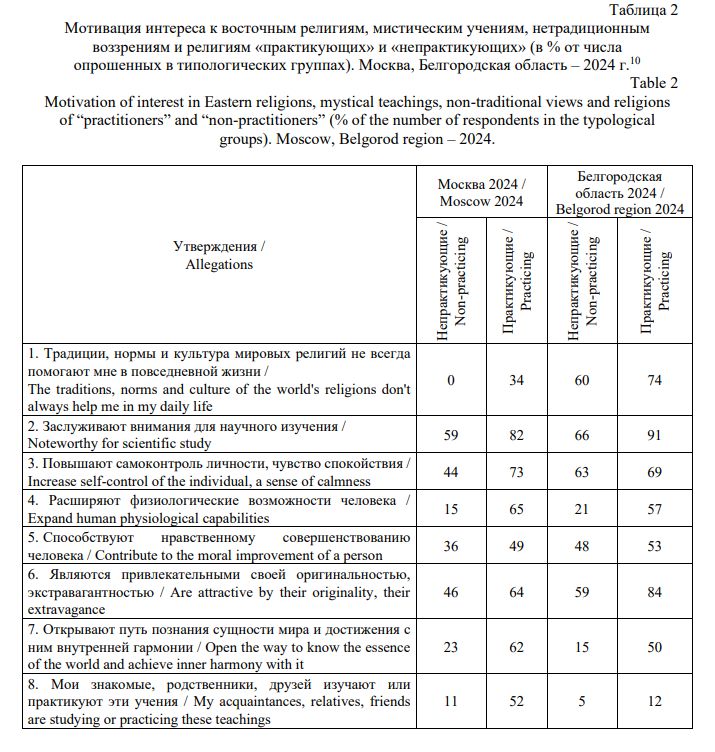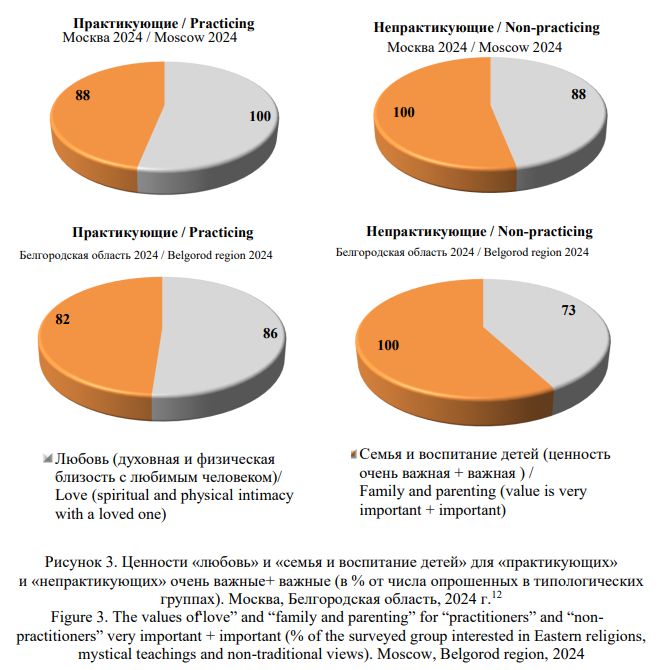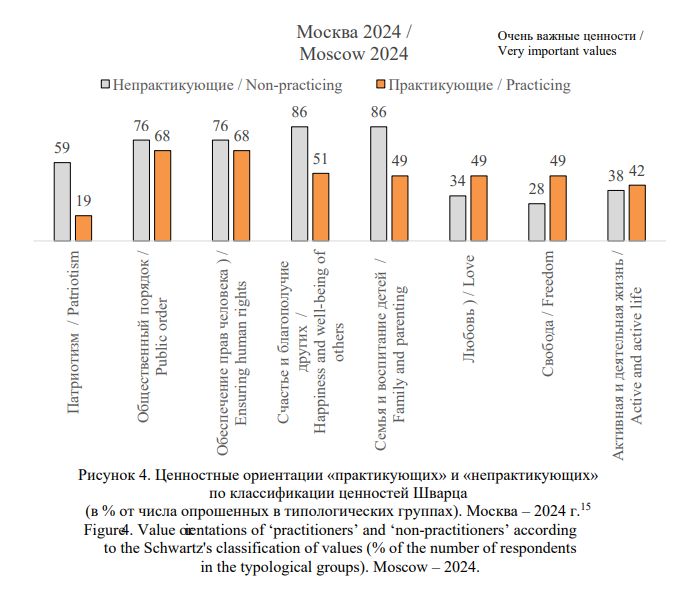Sociocultural and family values of Russians with non-traditional religious views (on the example of Moscow and Belgorod region)
The article analyzes the results of research conducted in Moscow and the Belgorod Region in 2024 by the Department of Ethnodemographic, Religious and Integration Processes of the Institute of National Research and Scientific Research of the Russian Academy of Sciences. In the context of the continuous change of the religious landscape, it is becoming increasingly important to study the value system that determines the behavior of population groups with non-traditional religious views. A sociological analysis of the family and socio-cultural orientations of the population of Moscow and the Belgorod region with non-traditional religious views was carried out. The methodological approach of the sociological search was based on the formation of two typological groups with non-traditional religious beliefs: “practitioners” and “non-practitioners”. The groups were selected based on indicators of non-traditional religious consciousness, motivation of interest and cult behavior (participation in relevant social practices). It was revealed that the population of the metropolitan metropolis shows more interest in non-traditional religious teachings, their spiritual and physical practices, as well as mystical currents compared to the population of the “Belgorod region”. It is quite natural that the motivation for fascination with these religions and teachings is more serious and deep in the “practitioners” groups. Sociological data from population surveys in Russian regions showed that there are more unmarried and childless respondents in the “practicing” groups, and more large families in the “non-practicing” groups. It is quite natural that for these groups, the values of “family and parenting” are more important than just the value of “love”. And in the “practitioners” groups, on the contrary, the value of “love” is more important than the values of family and childhood. The relation of typological groups to traditional socio-cultural and family values was partially determined using the Schwarz S. qualification scale of values and the rating scale of “ideas and values of national accord” used by sociologists and demographers for more than 20 years. Traditional values and ideas, actively transmitted by the fiction of the 18th and 19th centuries and the entire Russian culture and continuing to live in the “historical memory” of the Soviet people, as well as in the modern historical period, are the national heritage of our society and the state. The results of sociological research in these subjects of the Russian Federation demonstrate that respondents who engage in the activities in question exhibit a more active and independent lifestyle compared to those who do not. They also demonstrate a closer alignment with the values associated with these activities. The respondents who were actively engaged in these activities reported a higher level of life satisfaction, self-development, and freedom. The typological group of “non-practitioners” is mostly “social activists”: traditional family values, ideas of collectivism, legality, and patriotism are more important to them.
Figures









Kublitskaya, E. A., Lyutenko, I. V. (2024), “Sociocultural and family values of Russians with non-traditional religious views (on the example of Moscow and Belgorod region)”, Research Result. Sociology and Management, 10 (4), 5-30 . DOI: 10.18413/2408-9338-2024-10-4-0-1


















While nobody left any comments to this publication.
You can be first.
Eysenck, G., Sargent, K. (2001), Objasnenie neobjasnimogo. Tajny paranormal'nyh javlenij [Explaining the Unexplainable. Secrets of paranormal phenomena], Eksmo-Press, Moscow, Russia, 384. (In Russian)
Analitika misticizma [Analytics of Mysticism] (2011), in Balagushkin, E. G. (ed), Canon, Moscow, Russia, 432. (In Russian)
Bazarov, B. V. (2014), “Buddhism and the challenges of the XXI century”, Bulletin of the Buryat Scientific Center of the Siberian Branch of the Russian Academy of Sciences, (15), 12-16. (In Russian)
Balagushkin, E. G. (1984), Kritika sovremennyh netradicionnyh religij [Critique of modern non-traditional religions], Moscow State University Press, Moscow, Russia. (In Russian)
Barker, A. (1997), Novye religioznye dvizhenija [New religious movements], Publishers of Russian Christian Institute for the Humanities, St. Petersburg, Russia, 280. (In Russian)
Vasilieva, E. N. (2011), Cerkov' i sekta: razvitie nauchnyh predstavlenij [Church and sect: the development of scientific ideas], LAP, Germany, 183. (In Russian)
Gaidukov, A. V. (2016), “New paganism. Neo-Paganism. Rodnovery: the problem of terminology”, Jazychestvo v sovremennoj Rossii: opyt mezhdisciplinarnogo issledovanija [Paganism in modern Russia: the experience of interdisciplinary research], Mininsky University, N. Novgorod, Russia, 24-46. (In Russian)
Ivanova, S. Yu. (2014), “Change of value paradigm of the Russian society in the era of transit”, Modernizacija polijetnichnogo regiona i sopredel'nyh gosudarstv: opyt, problemy, scenarii razvitija: materialy Vserossijskoj nauchnoj konferencii [Modernization of multi-ethnic region and neighboring states: experience, problems, development scenarios: materials of the All-Russian scientific conference], Izd-vo UNC RAS, Rostov n/D, Russia, 47-53. (In Russian)
Inglehart, R. I. (2018), Kul'turnaja jevoljucija: kak izmenjajutsja chelovecheskie motivacii i kak jeto menjaet mir [Cultural evolution: how human motivations change and how it changes the world], Translated by Lopatina,S. L., in Zavadskaya, M. A.,Kosenko, V. V., Shirokanova, A. A., Panarin, E. D. (ed), Mysl, Moscow, Russia, 347. (In Russian)
Kanterov, I. Ya. (2007), Novye religioznye dvizhenija v Rossii (religiovedcheskij analiz) [New Religious Movements in Russia (Religious Studies Analysis)], Lomonosov Moscow state university, Moscow, Russia, 472. (In Russian)
Karandashev, V. N. (2004), Metodika Shvarca dlja izuchenija cennostej lichnosti: koncepcija i metodicheskoe rukovodstvo [Schwartz Methodology for the Study of Personal Values: Concept and Methodological Guidelines], Rech, SPb., Russia, 70. (In Russian)
Kolosov, G. N., Chingina, E. N. (2019), “Perception of spiritual and physical practice in yoga in the world and in Russia”, E-Scio, 10(37), [Online], available at: https://cyberleninka.ru/article/n/vospriyatie-duhovnoy-i-fizicheskoy-praktiki-v-yoge-v-mire-i-v-rossii (Accessed 21 June 2024). (In Russian)
Konopleva, A. A., Kahuta, I. O. (2019), “Reasons for the popularity of neo-paganism in modern Russian society”, Manuskript, (10), [Online], available at: https://cyberleninka.ru/article/n/prichiny-populyarnosti-neoyazychestva-v-sovremennom-rossiyskom-obschestve (Accessed 16 November 2024). (In Russian)
Kublitskaya, E. A. (2023), “The main values of consolidation of the Russian society in the perceptions of religious and non-religious student youth”, Research Result. Sociology and Management,, 9 (2). DOI: https://doi.org/10.18413/2408-9338-2023-9-2-2-0-3. (In Russian)
Kublitskaya, E. A. (1990), “Traditional and non-traditional religiosity: the experience of sociological study“, Sociological Studies, (5), 95-103. (In Russian)
Kublitskaya, E. A., Lebedev, S. D. (2019), “Religious situation in the Belgorod region (monitoring research)”, Social and humanitarian knowledge, (6), [Online], available at: https://cyberleninka.ru/article/n/religioznaya-situatsiya-v-belgorodskoy-oblasti-monitoringovye-issledovaniya (Accessed 07 November 2024). (In Russian)
Kublitskaya, E. A., Lyutenko, I. V. (2021), “Religiosity in the self-regulation of youth life activity”, Samoreguljacija zhiznedejatel'nosti molodezhi: metodologija i social'nye praktiki [Youth life self-regulation: methodology and social practices], Zubok, Yu. A., Bezrukova, O. N., Vishnevsky, J. R. et al, Epicenter, Belgorod, Russia, 217-247. (In Russian)
Campbell, D. (2019), Tysjachelikij geroj [Thousand-faced hero], Peter Publishing House, St. Petersburg, 480. (In Russian)
Lastochkina, M. A. (2015), “Life values of the population of the region in the socio-cultural context”, Vestnik Omskogo universiteta. Serija Jekonomika, (3), 141-146. (In Russian)
Lyutenko, I. V. (2022), “Interest in non-traditional religions among Moscow youth and migrants (comparative analysis 2021)”, Science. Culture. Society, 28 (4), 122-134. DOI: https://doi.org/10.19181/nko.2022.28.4.10 (In Russian)
Mitrokhin, L. N. (1997), Baptizm: istorija i sovremennost' (filosofsko-sociologicheskie ocherki) [Baptism: History and Modernity (philosophical and sociological essays)], RCHGI, SPb., Russia, 480. (In Russian)
Mitrokhin, L. N. (2000), Religija i kul'tura: (Filos. ocherki) [Religion and Culture: (Philos. Essays)], [L.N. Mitrokhin; Russian Academy of Sciences. Institute of Philosophy], IFRAN, Moscow, Russia, 316. (In Russian)
Pankratova, A. (2011), “Changing values of children and adults in modern Russia (1992-2009)”, Psychological Studies, 4 (15), DOI: https://doi.org/10.54359/ps.v4i15.875. (In Russian)
Ryzhov, Yu (2006), Ignoto Deo: novaja religioznost' v kul'ture i iskusstve [Ignoto Deo: New religiosity in culture and art], Mysl, Moscow, Russia, 328 (In Russian)
Ulanov, M. S. (2007), “Buddhism in the context of globalization”, Gosudarstvo, religija, cerkov' v Rossii i za rubezhom, 25 (1-2), 252-261. (In Russian)
Shizhensky, R. V. (2014), Pochvennik ot jazychestva: mirovozzrencheskie diskursy volhva Velimira (N.N. Speranskogo) [Pochvennik from paganism: worldview discourses of the Volkhov Velimir (Speransky N. N.)], Printing House “Povolzhye”, N. Novgorod, Russia. (In Russian)
Engelstein, L. (2002), Skopcy i carstvo nebesnoe [Castration and the Heavenly Kingdom], NLO, Moscow, Russia, 328. (In Russian)
Yakovleva, Yu. A. (2015), “Family attitudes of Russian carriers of non-traditional religiosity”, Sistema cennostej sovremennogo obshhestva, (40), [Online], available at: https://cyberleninka.ru/article/n/semeynye-ustanovki-rossiyskih-nositeley-netraditsionnoy-religioznosti (Accessed 05 December 2024). (In Russian)
Bainbridge, W. S. (1997), The Sociology of Religious Movements, Routledg, New York, 488. DOI: https://doi.org/10.4324/978020376
Beckford, J. A. (1985), Cult Controversies: The Societal Response to New Religio Movements, Tavistock Publ., London-New York, 335.
Bronner, S. J. (2000), “The Meanings of Tradition: An Introduction”, Western Folklore, 59 (2), 87-104.
Campbell, C. (1972), “The Cult, the Cultic Milieu and Secularization”, A Sociological Yearbook of Religion in Britain, 5, 119-36.
Casanova, J. (1994), Public Religions in the Modern World, The University of Chicago Press, Chicago and London, 320.
Clarke, P. B. (1999), Bibliography of Japanese New Religious Movements, Routledge, London & New York, 276.
Daniels, T. (1992), Millennialism: an international bibliography, Garland Publishing, New York, 657.
Dawson, L. L. (1998), “The cultural significance of new religious movements and globalization A theoretical prolegomenon”, Journal for the Scientific Study of Religion, (4), 580-595. DOI: https://doi.org/10.2307/1388142.
Lillqvist, O., Lindeman, M. (1998), “Belief in astrology as a strategy for self-verification and coping with negative life-events”, European Psychologist, 3(3), 202-208. DOI: https://doi.org/10.1027/1016-9040.3.3.202
Shupe, A. D. (1984), The Anti-cult Movement in America: A Bibliography and Historical Survey, Garland, New York, 169.
Stark, R., Bainbridge, W. (1981), “Secularization and Cult Formation in the Jazz Age”, Journal for the Scientific Study of Religion, 20 (4), 360-373.
Stark, R., Bainbridge, W. S. (1985), The Future of Religion: Secularization, Revival and Cult Formation, Berkeley, 571.
Schwartz, S. H. (1992), “Universals in the content and structure of values: Theory and empiri. cal tests in 20 countries”, M. Zanna (ed.). Advances in experimental social psychology, 25, Academic Press, New York, 1-65.
Tyson, G. A. (1982), “People who consult astrologers: A profile”, Personality and Individual Differences, 3 (2), 119-126. DOI: https://doi.org/10.1016/0191-8869(82)90026-5.